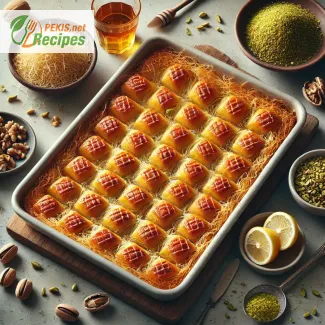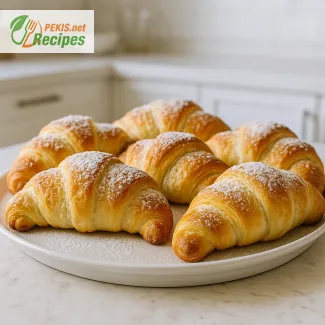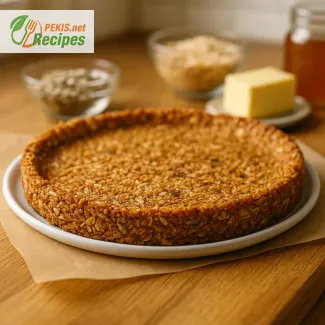
Indulge in the rich flavors and unique textures of Kadaif, a traditional dessert cherished across the Middle East, Mediterranean, and Balkan regions. Known for its golden, crispy noodle layers paired with sweet, aromatic syrup and a nutty filling, Kadaif is more than just a dessert—it's a culinary masterpiece that delights the senses with every bite.
A Symphony of Flavors and Textures
At the heart of Kadaif is the crispy shredded phyllo dough, also referred to as "kataifi." These delicate strands are carefully layered and filled with a blend of finely chopped nuts, such as walnuts, pistachios, or almonds, which provide a satisfying crunch and a burst of natural sweetness. The dessert is then baked to perfection, allowing the noodles to achieve a golden, crispy exterior while the nuts become slightly roasted, enhancing their flavor.
Once baked, the magic happens as the dessert is drizzled with a fragrant sugar syrup infused with hints of lemon, rose water, or orange blossom. This syrup soaks into the layers, creating a perfect balance of sweetness while preserving the signature crunch of the noodles. Every forkful of Kadaif offers a harmonious contrast of textures: the crispiness of the noodles, the softness of the syrup, and the creaminess of the nut filling.
Rich in Tradition and History
Kadaif carries a cultural significance that transcends generations. Often prepared during festive occasions, family gatherings, and holidays, this dessert symbolizes hospitality and celebration. Its preparation, though simple, requires care and precision, making it a cherished ritual in many households. Whether served as a part of a lavish dinner spread or enjoyed with a cup of tea or coffee, Kadaif holds a special place in the hearts of those who savor it.
Perfect for Every Occasion
What makes Kadaif truly exceptional is its versatility. It can be shaped into individual rolls, layered in a baking dish, or even presented as elegant nests filled with nuts. This flexibility allows for creativity in presentation, making it ideal for everything from intimate gatherings to large parties. Its golden hue and intricate texture make it as visually appealing as it is delicious.
Additionally, Kadaif can be adapted to suit various dietary needs. For those seeking a gluten-free option, alternative shredded doughs made from rice or corn can be used. Similarly, replacing the traditional sugar syrup with honey or agave nectar can offer a naturally sweetened variation.
Health Benefits Hidden in Indulgence
While Kadaif is undeniably a decadent treat, it also boasts some surprising nutritional elements. The nut filling provides a dose of healthy fats, proteins, and essential vitamins, such as vitamin E, magnesium, and potassium. These contribute to heart health, energy production, and improved cognitive function. The inclusion of lemon or floral-infused syrup adds a refreshing touch of antioxidants, enhancing its appeal as a wholesome dessert.
Why Kadaif Deserves a Place on Your Table
Kadaif is more than a dessert—it's an experience that captures the essence of rich culinary traditions. Its combination of flavors, textures, and aromatic ingredients creates a dessert that is both indulgent and sophisticated. Perfect for those who appreciate the art of baking, Kadaif offers an opportunity to explore a world of flavor while impressing family and friends with your culinary skills.
Whether you're a seasoned baker or a novice in the kitchen, preparing Kadaif is a rewarding journey. With simple ingredients and a touch of patience, you can create a dessert that rivals those found in the finest bakeries. Serve it warm with a drizzle of syrup or chilled for a refreshing treat, and watch as this crispy noodle delight becomes the star of your dessert repertoire.
Kadaif is a timeless dessert that blends tradition with elegance. Its irresistible flavor profile and eye-catching presentation make it a standout choice for any occasion. Whether you're celebrating a special event or simply treating yourself, this crispy noodle treat promises to deliver an unforgettable culinary experience. Try it today and savor the magic of Kadaif—an authentic dessert that transcends borders and brings people together.
- Prepare the kadaif dough:
- Preheat your oven to 180°C (350°F).
- Separate the shredded kadaif dough strands using your hands to loosen them. This ensures even baking.
- Pour the melted butter over the dough, gently massaging it through to coat all the strands evenly.
- Prepare the filling:
- In a bowl, mix the chopped walnuts or pistachios with sugar and cinnamon. Set aside.
- Assemble the kadaif:
- Grease a 30x20 cm (12x8 inch) baking dish.
- Divide the kadaif dough into two equal portions.
- Spread half of the dough evenly in the baking dish, pressing it down gently.
- Spread the nut mixture over the dough in an even layer.
- Cover with the remaining kadaif dough, pressing it down firmly to secure the filling.
- Bake:
- Bake in the preheated oven for 40-45 minutes, or until the top is golden brown and crispy.
- Prepare the syrup:
- While the kadaif is baking, combine water and sugar in a saucepan. Heat over medium heat, stirring until the sugar dissolves.
- Bring the mixture to a boil, then reduce the heat and simmer for 10 minutes.
- Add lemon juice and rose/orange blossom water if using. Remove from heat and let cool slightly.
- Combine:
- Once the kadaif is baked, remove it from the oven and immediately pour the warm syrup evenly over the dessert.
- Allow the syrup to soak into the kadaif for at least 1 hour before serving.
- Serve:
- Cut the kadaif into squares or diamond shapes. Garnish with crushed nuts, if desired, and serve at room temperature or chilled.
Tips and Variations to Enhance Your Kadaif Dessert Recipe
The Kadaif dessert is a versatile and timeless treat, offering plenty of opportunities to customize and adapt based on personal taste, dietary preferences, or ingredient availability. Below, you’ll find expert tips and ideas to modify the recipe while maintaining its unique charm. Each adjustment brings subtle or bold changes to the flavor, texture, or presentation, making the dessert a true reflection of your culinary creativity.
Customizing the Filling
Nut Choices
- Traditional flavors: The classic nut filling features walnuts, pistachios, or almonds, which offer a rich, nutty taste. Walnuts are slightly bitter, pistachios provide a buttery sweetness, and almonds lend a mild, creamy flavor.
- Mixed nuts: Combine different nuts to create a layered flavor profile. For example, a mix of walnuts and pistachios provides the perfect balance of bitterness and sweetness.
- Exotic options: Swap the nuts for macadamias or hazelnuts for a distinct twist. These nuts add a creamy texture and unique flavor to the filling.
Substituting Nuts
- Nut-free options: For individuals with nut allergies, replace the nuts with:
- Shredded coconut: Adds a tropical flair and a chewy texture.
- Sunflower or pumpkin seeds: These offer a satisfying crunch while being allergy-friendly.
- Dried fruits like chopped figs or dates: Enhance the sweetness naturally, reducing the need for additional sugar.
Adjusting the Syrup
Sweetness Levels
- Traditional syrup: Made with sugar, water, and lemon juice, it delivers a balanced sweetness that complements the rich filling.
- Less sweet version: Reduce the sugar quantity in the syrup by 20-30% for a lighter dessert.
- Natural sweeteners: Replace sugar with honey or agave nectar for a more natural flavor. Honey adds a floral undertone, while agave keeps the syrup smooth and mild.
Flavor Enhancements
- Add a teaspoon of vanilla extract for a warm, aromatic undertone.
- Incorporate spices like cardamom or cloves to infuse the syrup with bold, exotic notes.
- Replace lemon juice with orange juice for a citrus-forward variation that pairs beautifully with pistachios.
Modifying the Kadaif Dough
Dough Type
- Traditional dough: The classic shredded phyllo provides a crispy texture when baked. For best results, ensure the strands are evenly coated with melted butter.
- Whole-wheat dough: For a heartier texture and nuttier flavor, use whole-wheat kadaif dough. This adds a subtle earthiness and increases the fiber content of the dessert.
- Gluten-free dough: Use gluten-free shredded phyllo dough for individuals with gluten intolerance or celiac disease. The taste and texture remain relatively similar, especially when well-buttered.
Butter Substitutes
- Plant-based butter: A dairy-free alternative that maintains the rich, crispy texture of the dough. Perfect for vegan adaptations.
- Olive oil: Use lightly flavored olive oil for a Mediterranean twist. It offers a slightly fruity undertone and a healthier fat profile.
Presentation and Serving Suggestions
Shape and Size
- Traditional tray bake: Layered in a rectangular baking dish, this is the easiest and most traditional approach.
- Individual rolls: Divide the kadaif dough into smaller portions and roll each with a small amount of filling. This creates elegant, single-serving portions perfect for parties.
- Nest-shaped kadaif: Shape the dough into small nests, fill the center with nuts, and bake. These make for a visually stunning presentation, ideal for festive occasions.
Garnishes
- Sprinkle crushed nuts on top for added texture and visual appeal.
- Dust the dessert with a pinch of powdered sugar or a touch of ground cinnamon to enhance its aroma.
- Add a drizzle of melted dark chocolate for a decadent, modern touch.
Dietary Modifications and Their Impact
Vegan Adaptations
- Replace butter with a plant-based alternative to make the dessert fully vegan.
- Use maple syrup or agave nectar instead of honey for the syrup.
Lower Calorie Version
- Reduce butter by 10-15%, ensuring the dough remains crispy but less rich.
- Use low-calorie sweeteners like erythritol or stevia for the syrup.
Higher Protein Variation
- Incorporate a tablespoon of ground flaxseed or chia seeds into the nut filling. These ingredients enhance the nutritional value and add a subtle crunch.
- Add a scoop of plant-based protein powder to the filling for a health-conscious twist.
How These Changes Impact the Recipe
- Flavor balance: Adjustments to the syrup or filling directly influence the dessert's overall sweetness and aroma. Natural sweeteners like honey add depth, while spices elevate complexity.
- Texture: Changes to the dough or filling impact the mouthfeel. Whole-wheat or gluten-free doughs may be slightly less crispy but still delicious. Substituting nuts with seeds or dried fruits creates a chewier filling.
- Nutritional profile: Modifications like reducing sugar or butter lower calorie content. Adding seeds or protein powder enhances the dessert's health benefits without compromising taste.
The Kadaif dessert is a testament to culinary tradition and creativity. By exploring these variations, you can tailor the recipe to suit any occasion, dietary preference, or personal taste. Each tweak brings its own charm, allowing you to create a dessert that is uniquely yours while maintaining the essence of this beloved treat.
- Contains allergens: Gluten (kadaif dough), Nuts (walnuts, pistachios), Dairy (butter).
- Substitutions:
- For gluten-free: Use gluten-free kadaif dough.
- For nut allergies: Replace nuts with shredded coconut or seeds like sunflower or pumpkin seeds.
- For dairy-free: Use plant-based butter alternatives.
- Vitamin E: Found in nuts; supports skin health and immunity.
- Magnesium: Present in nuts; aids muscle and nerve function.
- Potassium: Found in nuts; essential for heart health and regulating blood pressure.
- Iron: In nuts; supports red blood cell production.
- Polyphenols: Abundant in nuts and cinnamon; reduce inflammation and support heart health.
- Flavonoids: Present in rose/orange blossom water; protect against oxidative stress.
- Vitamin C: Found in lemon juice; boosts immunity and improves skin health.
Enjoy this timeless dessert that blends textures, flavors, and a touch of tradition!





